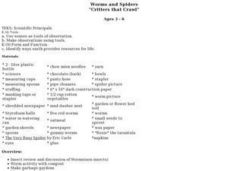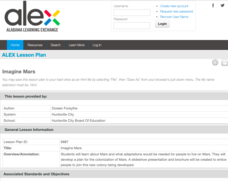Curated OER
History of Theory of Evolution
Students infer evolutionary relationships by comparing the physiological data or description. They write what they think would happen if a brown bear in the woods had an offspring that was white. Would this help the baby bear in its...
Curated OER
Lesson: Litter Hunt
Students examine the issue of littering. In this waste management lesson, students discover what littering is and how it affects the environment.
Curated OER
Which Tape is Stickiest?
Students conduct an experiment to determine which style of tape will stick the best. In this controlled experiment lesson, students predict which tape will stick best to a marble that rolls over it, then they conduct the experiment and...
Curated OER
Observing Brine Shrimp
Students observe brine shrimp eggs, create an appropriate environment for their survival, and observe their growth.
Curated OER
Introduction To Fractals: an Inquiry
Students evaluate a playful case study about a dog searching for fetching sticks to identify the steps in the science inquiry method. They read the case study and fill in a worksheet with the examples of questions, observations and...
Curated OER
What do I wear?
Students match different clothing with the weather on a worksheet to show what to wear in different weather conditions. In this weather lesson plan, students discuss the sheet in the end.
Curated OER
South Pole Base Gamma
Young scholars design a South Pole base. In this science lesson, students discuss characteristics of the South Pole and work in a group to design a base that will be named "Gamma." Young scholars sketch their design.
Curated OER
Who's Who?
Students explore biology by identifying animals and their environments. In this animal characteristic instructional activity, students read assigned text about farm animals, how they are raised, and what they are used for in our society....
Curated OER
Comparing Apples and Onions
Fifth graders observe heredity. In this Science lesson, 5th graders are introduced to the concept of traits being passed from parents to offspring. Students investigate the concepts through apples and onions.
Curated OER
What is ergonomics and why is it important?
Students come up with ideas to help friendly, superintelligent space aliens adapt to this environment.
Curated OER
Mineral Identification
Learners investigate the environment by examining mineral characteristics. In this mineral lesson, students perform scientific observations in groups in which they identify minerals found in everyday objects by using a worksheet. ...
Curated OER
Mealtime for Corals
Students explore how coral polyps feed. In this science lesson, students participate in an interactive game to demonstrate how polyps within a coral colony feed. Students become coral polyps and demonstrate how they feed in this lesson.
Curated OER
Here Today, Gone Tomorrow....?
Understanding the effects of an introduced species on the population of native species
Curated OER
The New Segregation
Students use census data to analyze the racial and economic diversity of their community. They discuss the role of diversity within communities and the impact that land use decisions can have on the composition of a community.
Curated OER
Worms and Spiders: "Critters That Crawl"
Students complete a unit of lessons on spiders and worms. They discuss worm and spider characteristics, create a garbage garden, observe worms, create gummy worm prints, read the book, 'The Very Busy Spider,' and construct a spider and...
Curated OER
Biomes -- Part 1
Learners use the internet to locate and gather information on the world's biomes. They compare and contrast biomes to ecosystems and describe the human effects on ecosystems. They answer questions to end the lesson.
Curated OER
Biomes -- Part II
Learners use the internet to gather information on the biomes of the world. They identify the climate and unique characteristics of each biome along with any threat to them. They create their own campaign to preserve wildlife.
Alabama Learning Exchange (ALEX)
Imagine Mars
Middle schoolers research the planet of Mars using the Internet. They analyze the factors that would enable people to live on Mars and present a slideshow presentation and brochure about Mars.
Curated OER
Mutations--Preexisting or Acquired?
Students explore the reasoning and experimental approaches to mutations. They expose a culture of E. coli to virulent bacteriophage and observe whether mutations of the cells existed previously or if the bacteria mutated as a response...
Curated OER
Agents of Erosion
Fourth graders explore the agents of erosion. They observe rocks that are rough and unweathered and record observations. They investigate rocks rubbed with sandpaper and ones that are not and the effects that the sandpaper has on the...
Curated OER
Germs and How to Fight Them
Students learn how important it is to stay healthy. In this germ lesson plan, student learn what germs are and the effect they have on healthy bodies and explore how important it is to keep their bodies healthy through a classroom...
Curated OER
Our Space Station Earth
Middle schoolers discover ways to preserve the Earth's resources. In this natural resources lesson, students investigate how many gallons of water the average American uses per day and then total their estimated usage. Middle schoolers...
Curated OER
HI-02-01 Somalia: A Failed Intervention?
Students study ethics and the importance on humanitarian interventions. In this lecture activity students read case studies and answer questions regarding the importance of government and humanitarian interventions then watch a film...
Curated OER
Minimize the Effects of Fire
Students explore environmental safety by reading assigned text in class. In this fires instructional activity, students discuss the benefits and negative aspects of lighting a fire near a campground. Students list other ways to avoid...

























